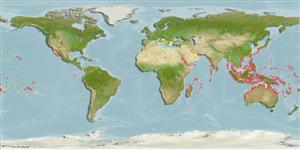Gastropoda |
Littorinimorpha |
Strombidae
Environment: milieu / climate zone / djupintervall / distribution range
Ekologi
; djupintervall 0 - 20 m (Ref. 349). Tropical
Indo-Pacific and the Mediterranean Sea.
Length at first maturity / Size / Weight / Age
Könsmognad: Lm ? range ? - ? cm Max length : 4.0 cm SHL hane/ej könsbestämd; (Ref. 349); common length : 3.5 cm SHL hane/ej könsbestämd; (Ref. 349)
Shell used in shellcraft (Ref. 349). Abundant in rocky reefs, either in exposed or in protected areas and in clear to turbid waters. Most common just below the low tide marks. Members of the family Strombidae are mostly herbivores , browsing on delicate algae, or swallowing sand and detritus to digest the decomposing plant matter (Ref. 349).
Life cycle and mating behavior
Könsmognad | Reproduktion | Lek | Eggs | Fecundity | Larvae
Members of the order Neotaenioglossa are mostly gonochoric and broadcast spawners. Life cycle: Embryos develop into planktonic trocophore larvae and later into juvenile veligers before becoming fully grown adults.
Poutiers, J.M. 1998 Gastropods. p. 363-648. In Carpenter, K. E. and V. H. Niem. 1998. FAO species identification guide for fishery purposes. The living marine resources of the Western Central Pacific. Volume 1. Seaweeds, corals, bivalves, and gastropods. Rome, FAO. (Ref. 349)
IUCN Red List Status
(Ref. 130435: Version 2025-1)
CITES status (Ref. 108899)
Not Evaluated
Not Evaluated
Threat to humans
Harmless
Human uses
| FishSource |
Verktyg
Ytterligare information
Trophic EcologyFood items (preys)
Födosammansättning
Födointag
Predatorer
Population dynamicsTillväxtMax. ages / sizesLength-weight rel.Length-length rel.Length-frequenciesMass conversionAbundans PhysiologySyreförbrukning
Human RelatedStamps, coins, misc.
Internet-källor
Estimates based on models
Preferred temperature
(Ref.
115969): 22.7 - 29.2, mean 28.3 (based on 3612 cells).
Fishing Vulnerability
Low vulnerability (10 of 100).
